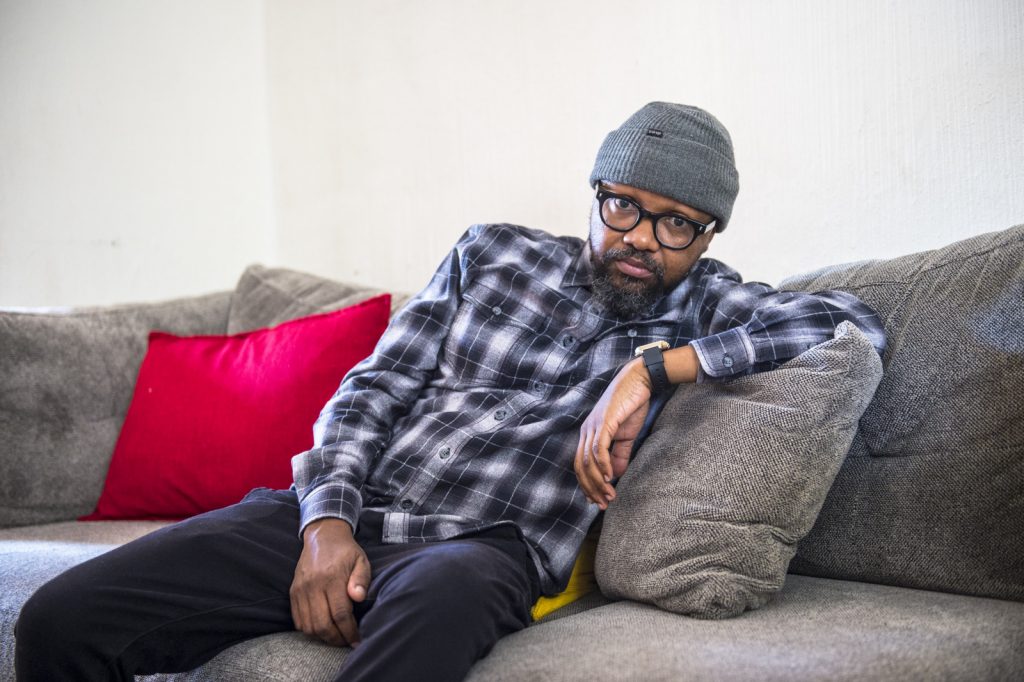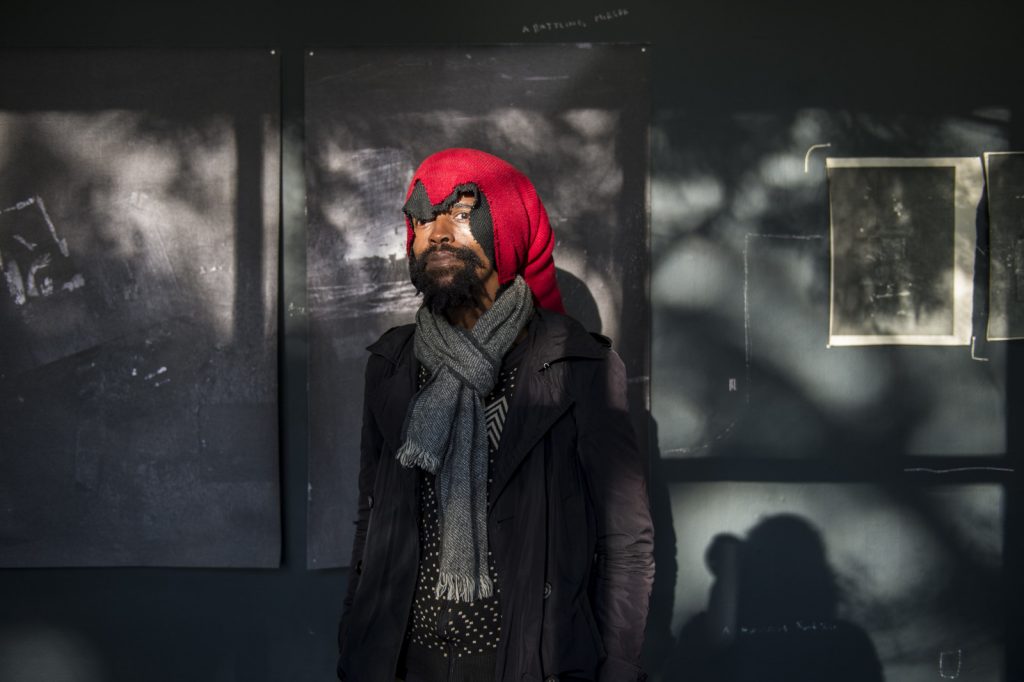Through the lens: Videographer
Andiswa Mkosi has
sustained archive losses.
There’s a moment during American filmmakers Coodie Simmons’ and Chike Ozah’s three-part Netflix film, Jeen-Yuhs, about Kanye West, where Coodie speaks about the alienation of being estranged from his “brother” as Kanye’s star continued to rise through the years.
He mentions the shock of having no access to someone whose journey he’d documented even before Kanye was signed to Roc-a-fella Records, and the resulting effect on his overall outlook professionally.
This is a familiar feeling among storytellers and archivists of different kinds, and something Diliza Moabi has had to get used to. A film editor by training, a director and an accomplished cinematographer, he has been present at the onset of a lot of people’s careers. He has footage of Bongeziwe Mabandla pre-Sony Music; of Simphiwe Dana pre-Gallo Records; and of HHP’s many phases throughout his musical evolution. Moabi’s archive is enviable.
While filming a conversation at journalist and author Percy Mabandu’s Dashiki Dialogues recently, he drew parallels between what he encountered as an independent filmmaker and what guitarist and musician Selaelo Selota was saying about the music industry’s divestment from live music. He spoke about how black people with means fail to invest in up-and-coming talent.
This tends to result in an imbalanced playing field, and routinely produces stories commodified to satisfy the whims of whoever has the money. Moabi gets into the specifics.
“Rich, black people don’t put money into this shit,” he says. To illustrate his point, he makes the case for the late John Singleton and Spike Lee’s respective filmmaking trajectories. “They’ve got talent, they’re independent-minded. But for them to have a career and make another movie, they still have to go to Hollywood because there’s no other place to go. Antoine Fuqua is frustrated as we speak. In my opinion, Creed was not a better movie than Southpaw … because Creed is a Stallone franchise.” His thoughts trail off but the point is made.
 Diliza Moabi documented top musicians’ careers
Diliza Moabi documented top musicians’ careers
“It’s a good thing that we get to hear people like Selaelo speak, because then you learn quickly that you’re not crazy. This shit is real, if they don’t like your agenda,” Moabi says. “That’s the shit that’s gonna send me to the grave. It’s almost like one chose the worst — I mean, I’m sure it’s the same in other industries — the worst career. To really do what you love and make money, one way or the other, you’re gonna have to work with a [white-owned] company. There’s no escaping it. Period. And that’s the hard part.”
On the other side of Moabi is someone like Lungelo Mntambo, who is also an independent filmmaker and documentarian/archivist. But the majority of his work is not targeted at television. The KwaZulu-Natal-born cultural worker details his early fascination with “capturing the moment”.
He says he picked up the camera after dropping out of university in 1996 but it wasn’t until 1998, when he became part of poetry movements such as PERM, and hip-hop movements such as Black Sunday (many years later), that he decided telling stories using video was the path he would pursue.
“I started realising that these guys are gonna grow at some point, and their starting point will be quite important so, let’s archive it now, while they’re still young. My observation on the lack of archived black people was clear, in a South African context. My uncle, Shaluza Max, travelled with Sarafina. He went around the world for about two years; he would come back home to Durban and tell us amazing stories of his journeys. But where are the videos? Where are the pictures?” asks Mntambo.
Mntambo qualifies his preference for video over photographs. “Looking at an image of someone singing, I cannot hear the music; an image of someone dancing … I don’t know what the move was before and the move after. And so I was much more interested in the video aspect of the archiving, because most of my friends were also photographers. [I wanted to] do something different [that] complements the photographic expression.”
As a result of Mntambo’s exploits in theatre and music, he has witnessed the births of legends. He runs down a list that features the late rapper, Pro; the underground Jozi rap crews Asylum Tribe and Basemental Platform; musicians Max Baloyi and Nduduzo Makhathini; and, as a result of his relationship with MELT2000s Robert Trunz, Busi Mhlongo and uMadala Kunene. There’s also archives from Kippies, Windybrow Theatre, and the Market Theatre.
 Lungelo Mntambo’s preferred medium is videography.
Lungelo Mntambo’s preferred medium is videography.
In the same league as the ability to document is the capacity to store and maintain the recorded footage. This is the shaky part to archiving, and one that often gets overlooked. One need not look further than the SABC, which are rumoured to have sold off its archive, or the various government departments that fail to maintain their records.
“Because I’m an independent archivist, the money is not prioritised or hardly ever comes in abundance,” says Mntambo. Before the advent of hard drives with large storage capacity, he used to leave his work on videotapes.
“I would have to buy tapes all the time, because if I film something, I don’t erase it. Then the digital phase came, and we moved from 8mm tapes to HDV tapes, then SD cards and the likes,” he says. “Now, having to digitise the material that is archived on tapes is the next move. I did manage to do some but it was too costly. We’re talking about more than 300 tapes, 90 minutes each.”
Carrying people’s stories comes with more than just financial and practical implications, it has an emotional burden too. Mntambo attests to this, as someone who struggles with mental health issues.
“When I was growing up, I heard multiple voices. I thought I was losing my mind. I would notice this in my own silence. I had to learn psychology; I would go to the library and collect books so that I can heal myself. At some point I got exposed to [Moses Molelekwa’s] Genes and Spirits. When my uncle and his wife were out at work, I would play the album out loud. Itumeleng, a very melodramatic song, came on and for the first time ever, the voices in my head just kept quiet and listened. I noticed that because the voices were always arguing,” says Mntambo.
“Moses passed, and I became scared that the voices were gonna start arguing again, and that I may literally lose my mind. So, I put up some money and started going to different universities to look for a pianist who could touch the same spots that Moses touched.”
In 2021, photographer and videographer Andiswa Mkosi lost the majority of half a decade’s worth of archived work. We spoke about the effect of the loss on her current approach.
“I think a lot of people don’t speak about archiving. I’ve lost a lot of work from the past five years. It’s really saddening because that’s your personal wealth in some way or another. But you just have to keep it going. I’m trying to find new ways to archive,” she says.
Mkosi, like Coodie, is also no stranger to being ghosted by people whose journeys she’s witnessed through her camera. Still, she remains forthright in her quest.
“I wouldn’t change this trade for anything else. Creating from scratch, having an idea, and making shit is dope, it’s too cool.”
She reflects on the loss of her material.
“More than anything else, it’s learning to let go. Because I can never get it back. It’s part of the trade, I guess; but when it happens to your entire catalogue, it’s heartbreaking. It’s taught me to let go, and not to hold on to things,” she says.
Unlike Mntambo, who is not entirely sold on the idea of the cloud as a viable storage option — mainly because of the cost — Mkosi is willing to give it a try.
Poet; @sheisnaledi
“It feels, and seems, like it’s the safest option for now. At least if the hard drive does whatever, you’ve got a backup of some sort. Now what I do is that after editing every project, regardless of what format it’s in, I upload all the selections on the cloud, so that I know where I can find them.”
As it turns out, telling our own stories will remain a pipe dream if those stories don’t reflect the experiences of black and brown people, but instead focus on vignettes that grantmakers and investors reckon will result in maximum returns. This directly affects niche artforms and stunts the reach of abundant talent.
Similar to Coodie and Chike, documentation of black art and culture by Moabi, Mntambo and Mkosi stretches across the board from made-for-television content to music videos and to feature films. But it’s clearly not enough.